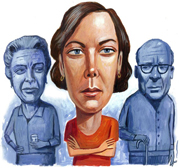
The Slate, 2.18.13
The relationship of adult children to their abusive parents gets little attention in the psychiatric literature. In an article in The Slate (The Debt, 2.18.13), columnist Emily Yoffe asks what grown children owe terrible, abusive parents when the latter come crawling back, often elderly, feeble and needy; she offers her take on forgiveness. The following is a selection from her longer article.
* * *
What do we owe our tormentors? It’s a question that haunts those who had childhoods marked by years of neglect and deprivation, or of psychological, physical, and sexual abuse at the hands of one or both parents. Despite this terrible beginning, many people make it out successfully and go on to build satisfying lives. Now their mother or father is old, maybe ailing, possibly broke. With a sense of guilt and dread, these adults are grappling with whether and how to care for those who didn’t care for them.
According to the Centers for Disease Control and Prevention, about 3.3 million cases of abuse or neglect were reported to child protective service agencies in 2010. This vastly undercounts the actual number of horrific and painful childhoods, as most never make it into any official record. The CDC notes that some studies estimate that 20 percent of children will be the victims of such maltreatment. That means a lot of people are wrestling with this legacy.
Loved ones and friends — sometimes even therapists — who urge reconnecting with a parent often speak as if forgiveness were a psychic aloe vera, a balm that will heal the wounds of the past. They warn of the guilt that will dog the victim if the perpetrator dies estranged. What these people fail to take into account is the potential psychological cost of reconnecting, of dredging up painful memories and reviving destructive patterns.
One doesn’t just leave abusive/neglectful parenting behind, like outgrowing a fear of the dark. Study after study has found that just as an emotionally warm, intellectually stimulating childhood is typically a springboard for a happy, healthy life, an abusive one can cause a litany of problems. Abuse victims are more likely to suffer from depression, substance abuse, broken relationships, chronic diseases, and even obesity. Many of the high-functioning people I hear from who are wrestling with their debt to their parents have struggled with some of these issues.
I know from my own inbox that many people are looking for someone, anyone, to tell them they should not feel guilty for declining to care for their abuser. I’m happy to do it. In private correspondence with these letter writers, I sometimes point out that, judging by their accounts, there doesn’t seem to be any acknowledgement of guilt on the part of the parent for neglecting to meet their most basic responsibilities.
Eleanor Payson, a marital and family therapist in Michigan and the author of The Wizard of Oz and Other Narcissists, advises clients guilt-ridden by the demands of now feeble, abusive parents to find ways to be caring while protecting themselves from further abuse, without allowing themselves to be tyrannized by false guilt and without ignoring their own pain and needs. Setting limits is crucial: “You may need to keep yourself in a shark cage with no opportunity to let that person take a bite out of you.” It’s also OK for the conversation to be anodyne. “You can say something respectful, something good-faith-oriented. ‘I wish you well’; ‘I continue to work on my own forgiveness.’ ”
In a 2008 essay in the journal In Character, history professor Wilfred McClay writes that as a society we have twisted the meaning of forgiveness into a therapeutic act for the victim: “Forgiveness is in danger of being debased into a kind of cheap grace, a waiving of standards of justice without which such transactions have no meaning.”
Jean Bethke Elshtain, a professor at the University of Chicago Divinity School writes that, “There is a watered-down but widespread form of ‘forgiveness’ best tagged preemptory or exculpatory forgiveness. That is, without any indication of regret or remorse from perpetrators of even the most heinous crimes, we are enjoined by many not to harden our hearts but rather to ‘forgive.’ ”
I agree with these more bracing views about what forgiveness should entail. Choosing not to forgive does not doom someone to being mired in the past forever. Accepting what happened and moving on is a good general principle. But it can be comforting for those being browbeaten to absolve their parents to recognize that forgiveness works best as a mutual endeavor. After all, many adult children of abusers have never heard a word of regret from their parent or parents. People who have the capacity to ruthlessly maltreat their children tend toward self-justification, not shame.
It’s wonderful when there can be true reconciliation and healing, when all parties can feel the past has been somehow redeemed. But I don’t think adult children who have suffered abuse at the hands of their parents should be hammered with lectures about the benefits of — here comes that dread word — closure. Sometimes the best thing to do is just close the door.